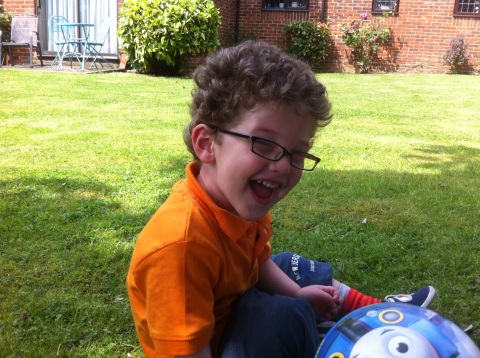Dear multitude of doctors / specialists / experts in your field that we have seen in the last 36 months,
Hello. I’m R’s mum. You might not remember who I am, although I generally see you biannually. That’s fine, you have plenty of patients, I’m sure only a handful stand out, and even less so by name. As a kid, I always took it for granted that my optometrists and the like knew my name and age, not supposing that the file on their laps acted as a subtle cheat sheet. It’s one of your many mythic properties, to remember and care for everyone individually.
But now I’m grown up, and my son is the patient. And while I don’t expect you to remember that he doesn’t like to speak in new places so there’s very little point you asking him if he likes cars, or that we don’t actually use that particular obvious nickname so he wont answer to it, I do expect a few things.
I expect you to remember what condition he has, and what you told us last time. It’s easy really, it’s all written on that very same cheat sheet. After all, we’ve been sitting in your waiting room for nearly two hours, another two minutes wouldn’t have hurt while you scanned your own spidery writing from six months ago. In contrast, I don’t need to be told as if for the first time that my son has Nystagmus, as that’s as obvious to me as you telling me his gender by now. I know his condition, I live it every day. That patronising explanation of what the condition means and what areas it may affect is a bit unnecessary, as after all, your notes would tell you that I have it too.
If I’m meeting you for the first time, there are a few ways to ensure we can be friends for life. Because I’m already your biggest fan, you’re helping my son. Anything you can give us in the way of advice, support and help is worthy of the boatloads of gratitude I continually give to the amazing people who work in our healthcare system. So it takes something out of the ordinary to shift my adoration in a first meeting. I’ll warn you from the outset so you can keep my boundless respect. Please don’t ask me “what’s wrong with” my son. Nothing is wrong with him. He has a condition. If he wasn’t too young to understand that comment, I would be outside drafting my letter of complaint right now.
Please don’t address my scepticism with I’ve been doing this for years… because all a mother hears is the silent …but not with my child, which is so easy to end the sentence with. Your years and your credentials mean nothing to me, if you cant try and get to know my kid as an individual.
Please don’t laugh and say “That’s the first time I’ve heard that one!” when I tentatively mention that another doctor has said something that differs from your point of view. If I can’t trust them, then ipso facto I can’t trust you. And if I can’t trust any of you, and I don’t know who to believe, then you’re saddling me with decisions and choices that I have no way of making on my own, and taking away the pure relief of handing over at least the medical side to what should be wiser heads than my own.
Try not to judge me instantly. I’m a mother, worried and proud, but that doesn’t make me hysterical and biased. I work, and enjoy it, but that doesn’t mean I neglect my son or don’t want to put the effort in. I’m a person, impatient for progress, but that doesn’t mean I’m looking for a cheat or a quick fix. And if I am guilty of any of the above? That’s okay too, because you don’t know my whole story.
You don’t look at my son with my eyes. You can’t see him, tiny and blind, with parents hopefully cooing at his sightless face, hoping for a response that he even knew we were there. You didn’t sit at home with me, too scared to go on play-dates with other excited new mums in case they asked me why my five month old didn’t smile. You didn’t share my joy when the smiles came, the movement came, the speech and understanding came at long last.
So if I want more information than you feel like explaining to my layman’s ears? I want more time than the ten minutes you’re allowed to give me, or more estimations than you’re really supposed to divulge at this stage? Humour me. Answer me. Don’t try and distract me away from answers to legitimate questions which you’ll forget as soon you close his file. Because I’ll take them home with me to fill my evenings with, for six more months until I come back resolved to ask them all again. I’ll worry and stew over your poorly chosen words and ambiguous predictions for the year ahead, until my friends and family are bored of hearing the same confused summaries.
He’s just a file to you. I can’t make him be anything else, and I’m glad. I need you to make the cool headed decisions and uninvolved assessments that I can’t ever make, and wouldn’t want to. But I’m not a file. I’m a mother. And I’m still here when that file closes.




